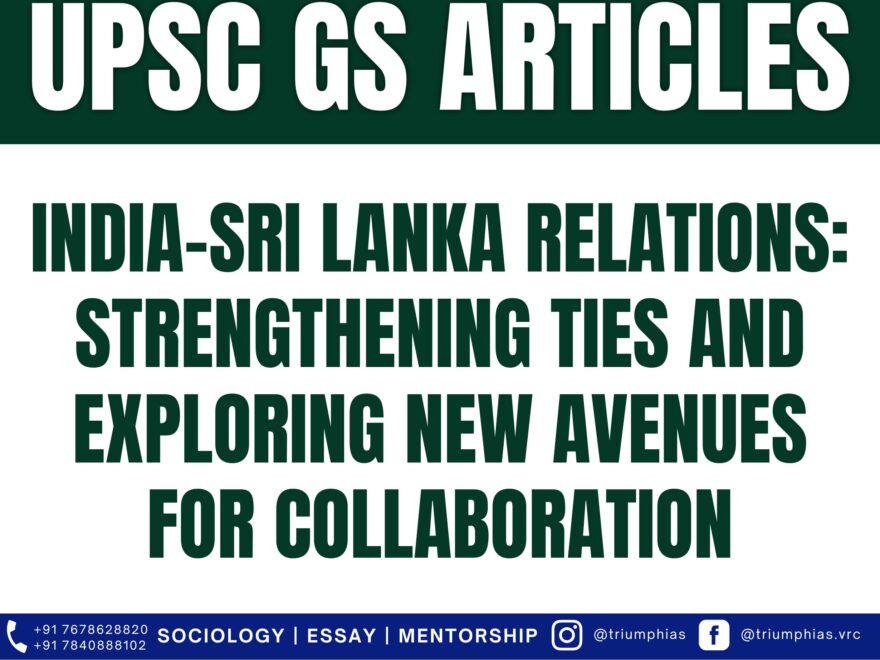India-Sri Lanka Relations: New Perspective
(Relevant for General Studies Paper Prelims/Mains)

India-Sri Lanka Relation
In recent times, the President of Sri Lanka paid a visit to India. Given that Sri Lanka holds a significant position within India’s “neighbourhood first” policy and its Vision for Security and Growth for All in the Region (SAGAR), this visit served to strengthen the enduring friendship between the two nations. Moreover, it sought to explore avenues for enhanced connectivity and collaborative efforts spanning various sectors.
Sri Lanka is a vital partner for India, particularly in terms of its regional approach. The visit underscored the enduring relationship between these two countries and delved into possibilities for improved connectivity and mutually advantageous cooperation across diverse domains.
Sri Lanka is India’s immediate neighbour, and the history of interaction between the two nations spans over 2,500 years. This lengthy association has been enriched by intellectual, cultural, religious, and linguistic exchanges. In contemporary times, this relationship has been characterized by frequent high-level political engagements, expanding trade and investments, joint efforts in development, education, culture, and defense sectors, as well as a shared comprehension of major global concerns.
Major MoUs Signed Between India and Sri Lanka
- The Joint Declaration of Intent (JDI) in the domain of Animal Husbandry and Dairying. Collaboration in the realm of renewable energy.
- Memorandum of Cooperation for initiatives in economic development within Sri Lanka’s Trincomalee district.
- Network to Network Agreement signed between NPCI International Payments Limited (NPIL) and Lanka Pay, facilitating the acceptance of Unified Payments Interface (UPI) applications in Sri Lanka. Granting of an energy permit for the Sampur Solar Power Project, which is set to generate 100 MW of power for Sri Lanka.
Relations Between India and Sri Lanka Been
- India and Sri Lanka share an extensive historical backdrop enriched with cultural, religious, and trade connections that date back to ancient epochs.
- Robust cultural links intertwine these two nations, with a considerable number of Sri Lankans tracing their ancestral roots to India. Notably, Buddhism, originating in India, holds substantial significance as a religion in Sri Lanka.
- In a moment of unprecedented economic turmoil, India extended around USD 4 billion in aid to Sri Lanka. This support proved instrumental in steering the country through the crisis.
- The year 2022 witnessed a severe financial debacle in Sri Lanka, the most severe since its independence from British rule in 1948, primarily attributed to a profound scarcity of foreign exchange reserves.
- India has actively engaged with the International Monetary Fund (IMF) and creditors, joining forces to facilitate the debt restructuring process for Sri Lanka.
- India stood as the pioneer in offering its endorsement for the financing and debt restructuring endeavor in Sri Lanka, solidifying their collaborative efforts.
- A mutual vision has been established by both nations, accentuating comprehensive connectivity across realms like People to People interaction, cooperative ventures in renewable energy, logistic coordination, port connections, and the establishment of grid connectivity to facilitate electricity trade.
- Given their substantial presence in the Indian Ocean, these two countries’ interactions are viewed in the wider context of regional dynamics and the Indian Ocean milieu.
- A shared aspiration for an Economic and Technology Cooperation Agreement (ETCA) has prompted both countries to explore avenues to integrate their economies and foster collective development.
- In a notable stride towards bolstering financial technology connectivity between the two nations, Sri Lanka has embraced India’s Unified Payments Interface (UPI) service.
- As Sri Lanka’s third-largest export destination, India follows the US and the UK in importance. Over 60% of Sri Lanka’s exports reap the advantages of the India-Sri Lanka Free Trade Agreement. Additionally, India emerges as a substantial investor in Sri Lanka’s economic landscape.
Significance of Bilateral Relations
- India’s progress is intricately interwoven with its neighboring nations, while Sri Lanka envisions integration with the Southern economy as a catalyst for its own developmental strides.
- The Indian Ocean, holding strategic significance for both trade and military endeavours, underscores its crucial role. Given Sri Lanka’s pivotal position intersecting major shipping routes, it emerges as a pivotal locus of control for India.
- Embracing the Unified Payments Interface (UPI) is poised to foster economic harmony and streamline business interactions between India and Sri Lanka. This move is poised to not only streamline trade activities but also bolster connectivity in the tourism sector between the two nations.
- One of the enduring matters between India and Sri Lanka pertains to fishing rights in the Palk Strait and the Gulf of Mannar. Sri Lankan authorities have recurrently apprehended Indian fishermen on charges of breaching the maritime boundary and engaging in unauthorized fishing within Sri Lankan waters.
- The permeable maritime demarcation line between India and Sri Lanka has raised apprehensions concerning border security and the illicit transportation of commodities, encompassing narcotics and undocumented migrants.
- The ethnic strife in Sri Lanka, particularly concerning the Tamil minority, stands as a delicate subject within India-Sri Lanka relations. India has historically exhibited concern regarding the well-being and entitlements of the Tamil community in Sri Lanka.
- India has articulated unease regarding China’s escalating economic and strategic sway over Sri Lanka, spanning Chinese investments in infrastructure endeavors and the evolution of the Hambantota Port. This has at times been perceived as a potential counteraction to India’s own vested interests within the region.
What is way forward?
- Enhancing Economic Collaboration: Both nations can collaborate in efforts to rectify trade imbalances and boost more extensive economic cooperation. Identifying sectors where interests harmonize and nurturing investments can pave the way for outcomes that mutually benefit both sides.
- Maintaining Equilibrium in External Relationships: While upholding amicable relations with other nations is crucial, India and Sri Lanka should ensure that their bilateral rapport remains resilient and is not disproportionately swayed by external influences.
- Fortifying Security Partnership: Jointly addressing security concerns and sharing intelligence can effectively tackle shared threats and augment trust between the two states.
- Resolving the Tamil Ethnic Matter: India can persist in its engagement with Sri Lanka to guarantee the safeguarding and preservation of the welfare and entitlements of the Tamil community. Providing support for initiatives aimed at ethnic reconciliation and devolution of authority can play a pivotal role in promoting stability and inclusiveness within Sri Lanka.
- Enhancing People-to-People Interaction: Fostering cultural exchanges, tourism, and educational bonds can nurture enhanced people-to-people interaction and enhance understanding between the citizens of both nations.
To master these intricacies and fare well in the Sociology Optional Syllabus, aspiring sociologists might benefit from guidance by the Best Sociology Optional Teacher and participation in the Best Sociology Optional Coaching. These avenues provide comprehensive assistance, ensuring a solid understanding of sociology’s diverse methodologies and techniques.
India-Sri Lanka relations, bilateral relations, regional approach, connectivity, cooperation, MoUs, economic development, security partnership, Tamil ethnic matter, people-to-people interaction, trade imbalances, foreign aid, investment, regional dynamics, Indian Ocean, fishing rights, border security, Unified Payments Interface (UPI), financial technology, Hambantota Port, China’s influence, Best Sociology Optional Coaching, Sociology Optional Syllabus.

Sociology Optional Syllabus
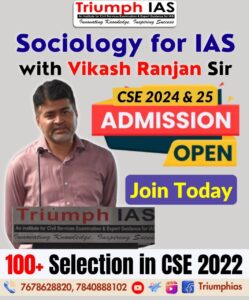
Course Commencement Information
- Enrolment is limited to a maximum of 250 Seats.
- Batch Timing: Evening Batch
- Course Duration: 4.5 Months
- Admission Open Online/Offline Batch
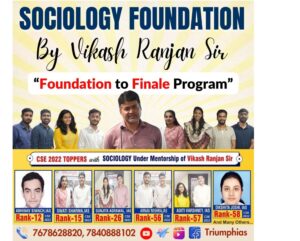
Instructional Format:
- Each class session is scheduled for a duration of two hours.
- At the conclusion of each lecture, an assignment will be distributed by Vikash Ranjan Sir for Paper-I & Paper-II coverage.
Study Material:
- A set of printed booklets will be provided for each topic. These materials are succinct, thoroughly updated, and tailored for examination preparation.
- A compilation of previous years’ question papers (spanning the last 27 years) will be supplied for answer writing practice.
- Access to PDF versions of toppers’ answer booklets will be available on our website.
- Post-course, you will receive two practice workbooks containing a total of 10 sets of mock test papers based on the UPSC format for self-assessment.
Additional Provisions:
- In the event of missed classes, video lectures will be temporarily available on the online portal for reference.
- Daily one-on-one doubt resolution sessions with Vikash Ranjan Sir will be organized post-class.
Syllabus of Sociology Optional
Paper-1
FUNDAMENTALS OF SOCIOLOGY
- Sociology – The Discipline
- Sociology as Science:
- Research Methods and Analysis:
- Sociological Thinkers:
- Karl Marx- Historical materialism, mode of production, alienation, class struggle.
- Emile Durkheim- Division of labour, social fact, suicide, religion and society.
- Max Weber- Social action, ideal types, authority, bureaucracy, protestant ethic and the spirit of capitalism.
- Talcott Parsons- Social system, pattern variables.
- Robert K. Merton- Latent and manifest functions, conformity and deviance, reference groups.
- Mead – Self and identity.
- Stratification and Mobility:
- Concepts- equality, inequality, hierarchy, exclusion, poverty and deprivation.
- Theories of social stratification- Structural functionalist theory, Marxist theory, Weberian theory.
- Dimensions – Social stratification of class, status groups, gender, ethnicity and race.
- Social mobility- open and closed systems, types of mobility, sources and causes of mobility.
- Works and Economic Life:
- Social organization of work in different types of society- slave society, feudal society, industrial /capitalist society
- Formal and informal organization of work.
- Labour and society.
- Politics and Society:
- Sociological theories of power.
- Power elite, bureaucracy, pressure groups, and political parties.
- Nation, state, citizenship, democracy, civil society, ideology.
- Protest, agitation, social movements, collective action, revolution.
- Religion and Society:
- Sociological theories of religion.
- Types of religious practices: animism, monism, pluralism, sects, cults.
- Religion in modern society: religion and science, secularization, religious revivalism, fundamentalism.
- Systems of Kinship:
- Family, household, marriage.
- Types and forms of family.
- Lineage and descent.
- Patriarchy and sexual division of labour.
- Contemporary trends.
- Social Change in Modern Society:
- Sociological theories of social change.
- Development and dependency.
- Agents of social change.
- Education and social change.
- Science, technology and social change.
Paper-2
INDIAN SOCIETY: STRUCTURE AND CHANGE
INTRODUCING INDIAN SOCIETY
- Perspectives on the study of Indian society:
- Indology (GS. Ghurye).
- Structural functionalism (M N Srinivas).
- Marxist sociology (A R Desai).
- Impact of colonial rule on Indian society :
- Social background of Indian nationalism.
- Modernization of Indian tradition.
- Protests and movements during the colonial period.
- Social reforms.
SOCIAL STRUCTURE
- Perspectives on the study of Indian society:
- The idea of Indian village and village studies.
- Agrarian social structure – evolution of land tenure system, land reforms.
- Caste System:
- Perspectives on the study of caste systems: GS Ghurye, M N Srinivas, Louis Dumont, Andre Beteille.
- Features of caste system.
- Untouchability – forms and perspectives.
- Tribal communities in India
- Definitional problems.
- Geographical spread.
- Colonial policies and tribes.
- Issues of integration and autonomy.
- Social Classes in India:
-
- Agrarian class structure.
-
-
- Industrial class structure.
- Middle classes in India.
-
- Systems of Kinship in India:
- Lineage and descent in India.
- Types of kinship systems.
- Family and marriage in India.
- Household dimensions of the family.
- Patriarchy, entitlements and sexual division of labour
- Religion and Society:
- Religious communities in India.
- Problems of religious minorities.
- Patriarchy, entitlements and sexual division of labour
SOCIAL CHANGES IN INDIA
- Visions of Social Change in India:
- Idea of development planning and mixed economy
- Constitution, law and social change.
- Education and social change.
- Rural and Agrarian transformation in India:
- Programmes of rural development, Community Development Programme, cooperatives,poverty alleviation schemes
- Green revolution and social change.
- Changing modes of production in Indian agriculture.
- Problems of rural labour, bondage, migration.
3. Industrialization and Urbanisation in India:
-
- Evolution of modern industry in India.
- Growth of urban settlements in India.
- Working class: structure, growth, class mobilization.
- Informal sector, child labour
- Slums and deprivation in urban areas.
4. Politics and Society:
-
- Nation, democracy and citizenship.
- Political parties, pressure groups , social and political elite
- Regionalism and decentralization of power.
- Secularization
5. Social Movements in Modern India:
-
- Peasants and farmers movements.
- Women’s movement.
- Backward classes & Dalit movement.
- Environmental movements.
- Ethnicity and Identity movements.
6. Population Dynamics:
-
- Population size, growth, composition and distribution
- Components of population growth: birth, death, migration.
- Population policy and family planning.
- Emerging issues: ageing, sex ratios, child and infant mortality, reproductive health.
7. Challenges of Social Transformation:
-
- Crisis of development: displacement, environmental problems and sustainability
- Poverty, deprivation and inequalities.
- Violence against women.
- Caste conflicts.
- Ethnic conflicts, communalism, religious revivalism.
- Illiteracy and disparities in education.
About Vikash Ranjan Sir
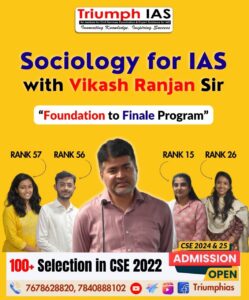
Vikash Ranjan Sir
(Best Sociology Optional Teacher, Educator, Mentor & Author)
Mr. Vikash Ranjan, arguably the Best Sociology Optional Teacher, has emerged as a versatile genius in teaching and writing books on Sociology & General Studies. His approach to the Sociology Optional Syllabus / Sociology Syllabus is remarkable, and his Sociological Themes and Perspectives are excellent. His teaching aptitude is Simple, Easy and Exam Focused. He is often chosen as the Best Sociology Teacher for Sociology Optional UPSC aspirants.
About Triumph IAS
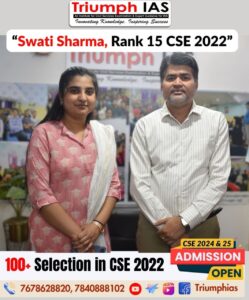
Innovating Knowledge, Inspiring Success We, at Triumph IAS, pride ourselves on being the best sociology optional coaching platform. We believe that each Individual Aspirant is unique and requires Individual Guidance and Care, hence the need for the Best Sociology Teacher. We prepare students keeping in mind his or her strength and weakness, paying particular attention to the Sociology Optional Syllabus / Sociology Syllabus, which forms a significant part of our Sociology Foundation Course.
Course Features
Every day, the Best Sociology Optional Teacher spends 2 hours with the students, covering each aspect of the Sociology Optional Syllabus / Sociology Syllabus and the Sociology Course. Students are given assignments related to the Topic based on Previous Year Question to ensure they’re ready for the Sociology Optional UPSC examination.
Regular one-on-one interaction & individual counseling for stress management and refinement of strategy for Exam by Vikash Ranjan Sir, the Best Sociology Teacher, is part of the package. We specialize in sociology optional coaching and are hence fully equipped to guide you to your dream space in the civil service final list.
Specialist Guidance of Vikash Ranjan Sir

Vikash Ranjan Sir is a specialist and arguably the Best Sociology Optional Teacher. His scientific, systematic, applied & exam-focused approach has helped many students to get selected in the Civil Services.
The Best Sociology Teacher helps students to get a complete conceptual understanding of each and every topic of the Sociology Optional Syllabus / Sociology Syllabus, enabling them to attempt any of the questions, be direct or applied, ensuring 300+ Marks in Sociology Optional.
Classrooms Interaction & Participatory Discussion
The Best Sociology Teacher, Vikash Sir, ensures that there’s explanation & DISCUSSION on every topic of the Sociology Optional Syllabus / Sociology Syllabus in the class. The emphasis is not just on teaching but also on understanding, which is why we are known as the Best Sociology Optional Coaching institution.
Preparatory-Study Support
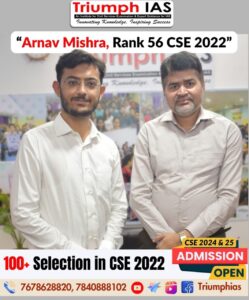
The Sociology Foundation Course is designed to provide students with a strong base for the Sociology Optional. Study support from Triumph IAS & personal mentorship of the Best Sociology Teacher, Vikash Sir, is provided till final selection. Vikash Sir provides special guidance session for “Essay & Mains General Study” too, making our Sociology Course a well-rounded one.
Online Support System (Oss)
Get access to an online forum for value addition study material, journals, and articles relevant to Sociology on www.triumphias.com. Ask preparation related queries directly to the Best Sociology Teacher, Vikash Sir, via mail or WhatsApp.
Strategic Classroom Preparation
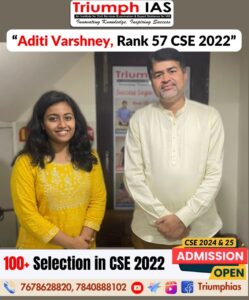
Our Sociology Course is characterized by interactive and applied teaching with an “Exam Focussed” approach, which inculcates a Sociological sense and competency in the students. The Sociology Foundation Course, lasting four months, includes theoretical discussion, concept building, and answer writing with a focus on learning & application.
Comprehensive Study Material
We provide printed booklets of concise, well-researched, exam-ready study material for every unit of the Sociology Optional Syllabus / Sociology Syllabus, making us the Best Sociology Optional Coaching platform.
Why Vikash Ranjan’s Classes for Sociology?
Proper guidance and assistance are required to learn the skill of interlinking current happenings with the conventional topics. VIKASH RANJAN SIR at TRIUMPH IAS guides students according to the Recent Trends of UPSC, making him the Best Sociology Teacher for Sociology Optional UPSC.
At Triumph IAS, the Best Sociology Optional Coaching platform, we not only provide the best study material and applied classes for Sociology for IAS but also conduct regular assignments and class tests to assess candidates’ writing skills and understanding of the subject.
Choose The Best Sociology Optional Teacher for IAS Preparation?
At the beginning of the journey for Civil Services Examination preparation, many students face a pivotal decision – selecting their optional subject. Questions such as “which optional subject is the best?” and “which optional subject is the most scoring?” frequently come to mind. Choosing the right optional subject, like choosing the best sociology optional teacher, is a subjective yet vital step that requires a thoughtful decision based on facts. A misstep in this crucial decision can indeed prove disastrous.
Ever since the exam pattern was revamped in 2013, the UPSC has eliminated the need for a second optional subject. Now, candidates have to choose only one optional subject for the UPSC Mains, which has two papers of 250 marks each. One of the compelling choices for many has been the sociology optional. However, it’s strongly advised to decide on your optional subject for mains well ahead of time to get sufficient time to complete the syllabus. After all, most students score similarly in General Studies Papers; it’s the score in the optional subject & essay that contributes significantly to the final selection.
“A sound strategy does not rely solely on the popular
Opinion of toppers or famous YouTubers cum teachers.”
It requires understanding one’s ability, interest, and the relevance of the subject, not just for the exam but also for life in general. Hence, when selecting the best sociology teacher, one must consider the usefulness of sociology optional coaching in General Studies, Essay, and Personality Test.
The choice of the optional subject should be based on objective criteria, such as the nature, scope, and size of the syllabus, uniformity and stability in the question pattern, relevance of the syllabic content in daily life in society, and the availability of study material and guidance. For example, choosing the best sociology optional coaching can ensure access to top-quality study materials and experienced teachers. Always remember, the approach of the UPSC optional subject differs from your academic studies of subjects. Therefore, before settling for sociology optional, you need to analyze the syllabus, previous years’ pattern, subject requirements (be it ideal, visionary, numerical, conceptual theoretical), and your comfort level with the subject.
This decision marks a critical point in your UPSC – CSE journey, potentially determining your success in a career in IAS/Civil Services. Therefore, it’s crucial to choose wisely, whether it’s the optional subject or the best sociology optional teacher. Always base your decision on accurate facts, and never let your emotional biases guide your choices. After all, the search for the best sociology optional coaching is about finding the perfect fit for your unique academic needs and aspirations.
To master these intricacies and fare well in the Sociology Optional Syllabus, aspiring sociologists might benefit from guidance by the Best Sociology Optional Teacher and participation in the Best Sociology Optional Coaching. These avenues provide comprehensive assistance, ensuring a solid understanding of sociology’s diverse methodologies and techniques. Sociology, Social theory, Best Sociology Optional Teacher, Best Sociology Optional Coaching, Sociology Optional Syllabus.
Best Sociology Optional Teacher, Sociology Syllabus, Sociology Optional, Sociology Optional Coaching, Best Sociology Optional Coaching, Best Sociology Teacher, Sociology Course, Sociology Teacher, Sociology Foundation, Sociology Foundation Course, Sociology Optional UPSC, Sociology for IAS,
Follow us :


https://t.me/VikashRanjanSociology
Find More Blogs
|
Scope of the subject and comparison with other social sciences |
|||
|
|
|
|
Modernity and social changes in Europe |

